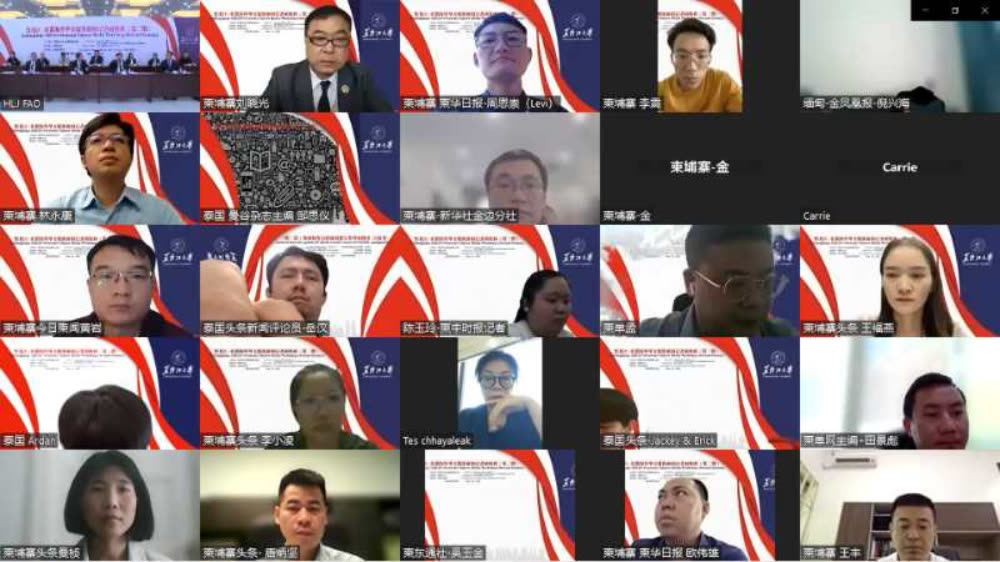
The “Heilongjiang-ASEAN Overseas Chinese-Language Media Workshop” is opened on May 18, 2023. SOURCE: China-Cambodia Times.
This month and next, journalists from Cambodia, Thailand, Myanmar, and other ASEAN member states will meet on-site in Phnom Penh as well as offline for training modules on short video production, news writing, and other skills, developing much-needed capacity in a region where news media have been constantly under threat in recent years.
These training sessions, however, are not about empowering journalists to report the news critically and effectively — what many experts and advocacy groups have argued is essential, particularly in light of the recent impact of the Covid-19 pandemic. Rather, they are about framing the region’s relationship with the giant next door: China.
Supported by the Foreign Affairs Office (FAO) of the government of China’s northeastern Heilongjiang Province — the area of the country geographically most distant from Southeast Asia — the training sessions further illustrate how initiatives by the Chinese Communist Party (CCP) to shape a positive global image of the country are the prerogative not just of national leaders and central state media, but are unfolding as a whole-society effort pursued by a wide range of actors, including local governments and educational institutions.
Held on May 18, the inaugural meeting of this year’s “Heilongjiang-ASEAN Overseas Chinese-Language Media Workshop” (海外华文媒体新闻记者研修班), which will run from May 24 to June 28, with 38 participants from across Southeast Asia, was attended by Wang Yongqing (王永清), the top CCP official from Heilongjiang University, which will lead the course modules. Wang encouraged participants to use the opportunity to improve their “journalism capabilities” (新闻业务能力).

But the involvement of Heilongjiang’s FAO, which on top of provincial diplomatic efforts is tasked with external propaganda, clearly signaled that the training event was about more than media skillsets. The opening session was led by Li Shengbin (李胜彬), an FAO deputy head. And the main address was delivered by Li’s superior, FAO director Wu Wen’ge (吴文革), who said the purpose of the training series was to “promote understanding of Heilongjiang among media in the ASEAN region, and to promote opportunities for cooperation within the RCEP framework.”
The RCEP refers to the Regional Comprehensive Economic Partnership, the regional trade agreement signed in November 2020 between 15 Asian countries, and accounting for around 30 percent of global GDP. Ten of the RCEP’s members are from Southeast Asia.
Heilongjiang’s direct engagement with journalists in Southeast Asia began back in September 2019, as the Chinese Consulate in Penang arranged for a “Malaysian Media Delegation” (马来西亚媒体团) to visit the province, where they were met by representatives from the provincial foreign affairs office as well as government officials from prefectural-level cities in the province.
Malaysia became the location of the first training session, held in November 2021, with Heilongjiang University joining as the training partner. Delivering the opening address to the 2021 session, China’s consul general in Penang, Lu Shiwei (鲁世巍), said he hoped the training sessions would teach participants “to use more vivid language, more advanced technology, and a more distinctive perspective to tell the story of China-Malaysia development and friendship and cooperation.” As the event corresponded with the CCP’s centennial celebrations, Lu also praised the achievements of the Party under the leadership of Xi Jinping, stressing that “China’s development brings new opportunities for the China-Malaysia relationship.”
Another partner in this year’s training session is the Cambodia-China Journalists Association (柬中记协), a group closely aligned with the Chinese government that has actively played a largely diplomatic as opposed to professional role among Southeast Asian journalists, encouraging positive narratives about China and its role in the region.
Speaking at the May 18 opening session, Liu Xiaoguang (刘晓光), co-chairman of the Cambodia-China Journalists Association, praised Heilongjiang’s FAO and Heilongjiang University for holding the two-week seminar, which he said “opened up a precedent for Chinese media training exchanges between local provinces in China and Southeast Asian countries.”
Liu expressed the hope that seminar trainees would promote Heilongjiang Province as well as deeper cooperation between China, Cambodia, Thailand, and Myanmar.
Meanwhile, coverage in the Heilongjiang Daily (黑龙江日报), the flagship newspaper of the Heilongjiang Committee of the CCP, reported that the aim of the training session, beyond basic skills training, was to “promote Chinese and foreign cultural communication and exchange,” and to deepen economic, trade and tourism cooperation with Cambodia, Thailand and Myanmar in particular.
Journalism and media-related engagements have been at the heart of diplomacy and outreach by Chinese cities and provinces to countries in Southeast Asia, as local and regional leaders in China recognize that domestic Chinese-language media in particular can help to shape positive images that are conducive to deeper trade and tourism relations.
Over the longer term, these exchanges could have a substantial impact on the capacity and willingness of journalists in Southeast Asian countries to report critically on a China that is increasingly influential across the region.
The Chinese-language Jianhua Daily (柬华日报) reported this week on an official visit to Cambodia by Li Qiufeng (李秋峰), the director of the CCP’s propaganda office in the city of Wuxi, in Jiangsu province. Li was accompanied on his visit by Chen Xichu (陈锡初), the CEO of the Wuxi Daily Newspaper Group, which publishes the city’s Party mouthpiece, as well as officials from the government’s Information Office, which is responsible for overseas propaganda.
Li Qiufeng told his hosts, including the Federation of Khmer Chinese in Cambodia (柬华理事总会), the local association that publishes the Jianhua Daily, that the goal of the delegation was to “strengthen cooperation with Cambodian media.”




















